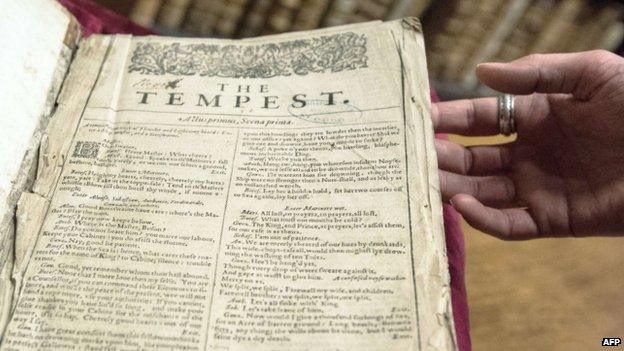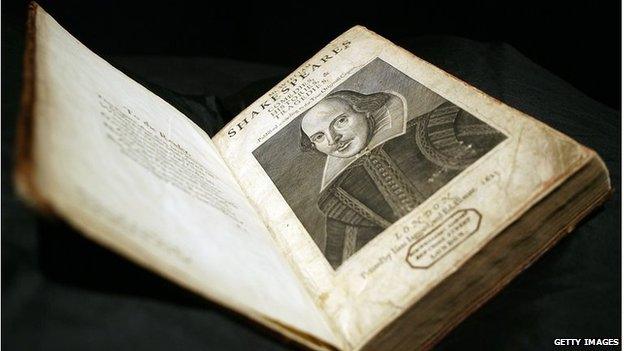Shakespeare Folio found in French library
- Published
Librarian and Medieval literature expert Rémy Cordonnier has discovered a rare and valuable William Shakespeare First Folio.
A rare and valuable Shakespeare First Folio, regarded as the most important book in English literature, has been discovered in a small French town.
The book had lain undisturbed in a library in Saint-Omer, near Calais in northern France, for 200 years.
It was discovered by librarians planning an exhibition on the historic links between the region and England.
"The work has several pages missing, including the title page," librarian Remy Cordonnier told the press.
The loss of the first page and introductory material may have led to the book being catalogued as an unexceptional old edition, he added.
The Folio collects 36 of Shakespeare's 38 known plays for the first time, and was originally printed in 1623, seven years after the playwright's death.
Edited by his friends and fellow actors John Heminges and Henry Condell, it is credited with being the reason his literary legacy survived. It is the only source for 18 of his plays, including Macbeth.

The Tempest appeared in print for the first time in the collection
It is thought that 800 copies were produced, of which 233 are believed to still exist.
New discoveries are made roughly once a decade, and they are scrutinised by scholars for minor variations (each copy is different) and what they might reveal about Shakespeare's intentions.
They rarely change hands but one of the last Folios to be sold at auction, in 2006, fetched £2.8m (£3.6m adjusted for inflation).
The copy discovered in Saint-Omer is one of only two known to reside in France.
Handwritten notes
Mr Cordonnier, who runs the library's rare books collection, said he had not initially realised the significance of his find.
"I didn't instantly recognise it as a book of value," he said. "It had been heavily used and was damaged. It had seen better days.
"[But] It occurred to me that it could be an unidentified First Folio, with historic importance and great intellectual value."
The librarian contacted one of the world's foremost authorities on Shakespeare, Professor Eric Rasmussen of the University of Nevada, who happened to be in London working at the British Library.
"He was very interested by the elements I had sent him by mail and said he would come over and take a look," said Mr Cordonnier.

This intact edition of the Folio sold for £2.8m in 2006 but the one found in Saint-Omer is likely to be worth less
Prof Rasmussen took the Eurostar to France last Saturday and authenticated the Folio within five minutes.
"This is huge," he told the New York Times, external. "First folios don't turn up very often, and when they do, it's usually a really chewed up, uninteresting copy. But this one is magnificent."
"It was very emotional to realise we had a copy of one of the most famous books in the world," said Mr Cordonnier. "I was already imagining the reaction it would cause."
The Folio contains several handwritten notes, which may illuminate how the plays were performed in Shakespeare's time.
In one scene from Henry IV, the word "hostess" is changed to "host" and "wench" to "fellow" - possibly reflecting an early performance where a female character was turned into a male.
The library says it has no plans to sell the book but intends to display it as the centrepiece of the forthcoming exhibition of its rare books by English authors.
However, the Folio is not the rarest book the Saint-Omer library owns. It also has a Gutenberg Bible, of which fewer than 50 are known to survive.